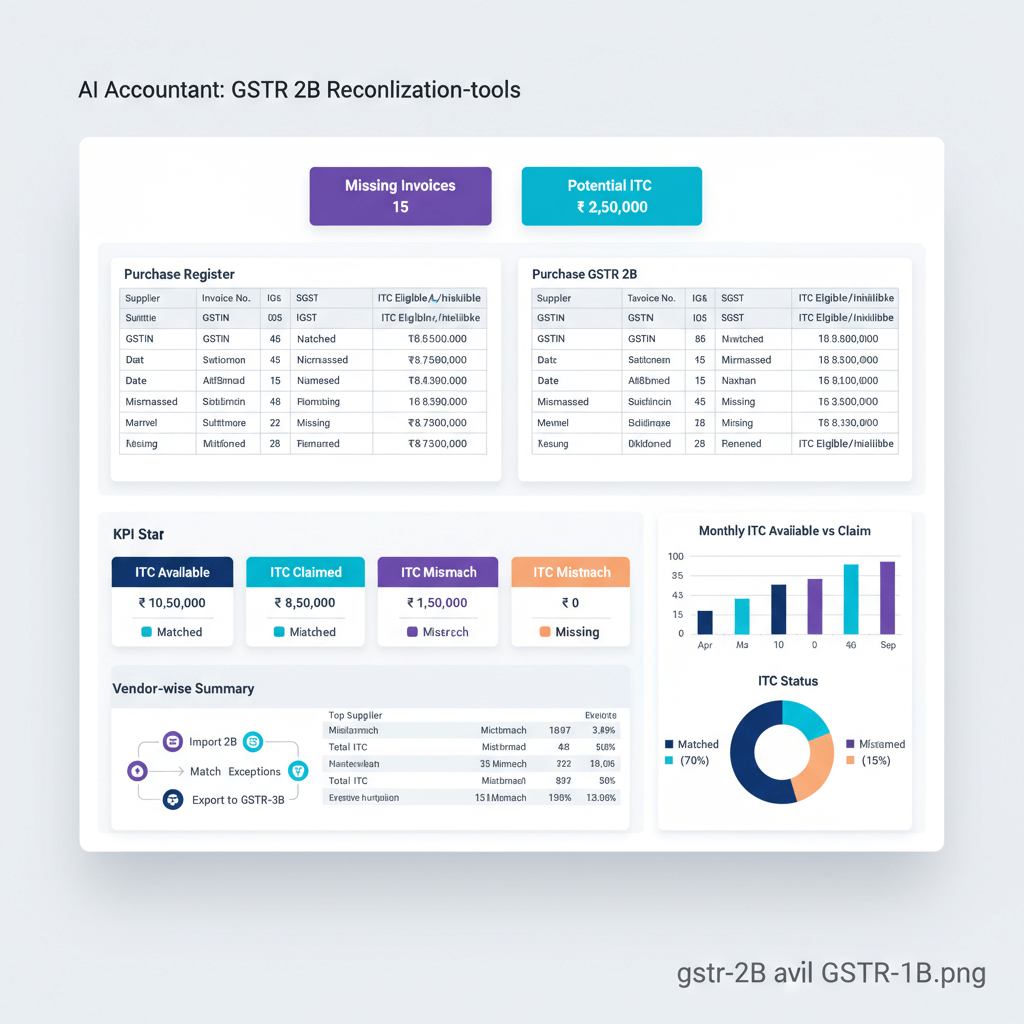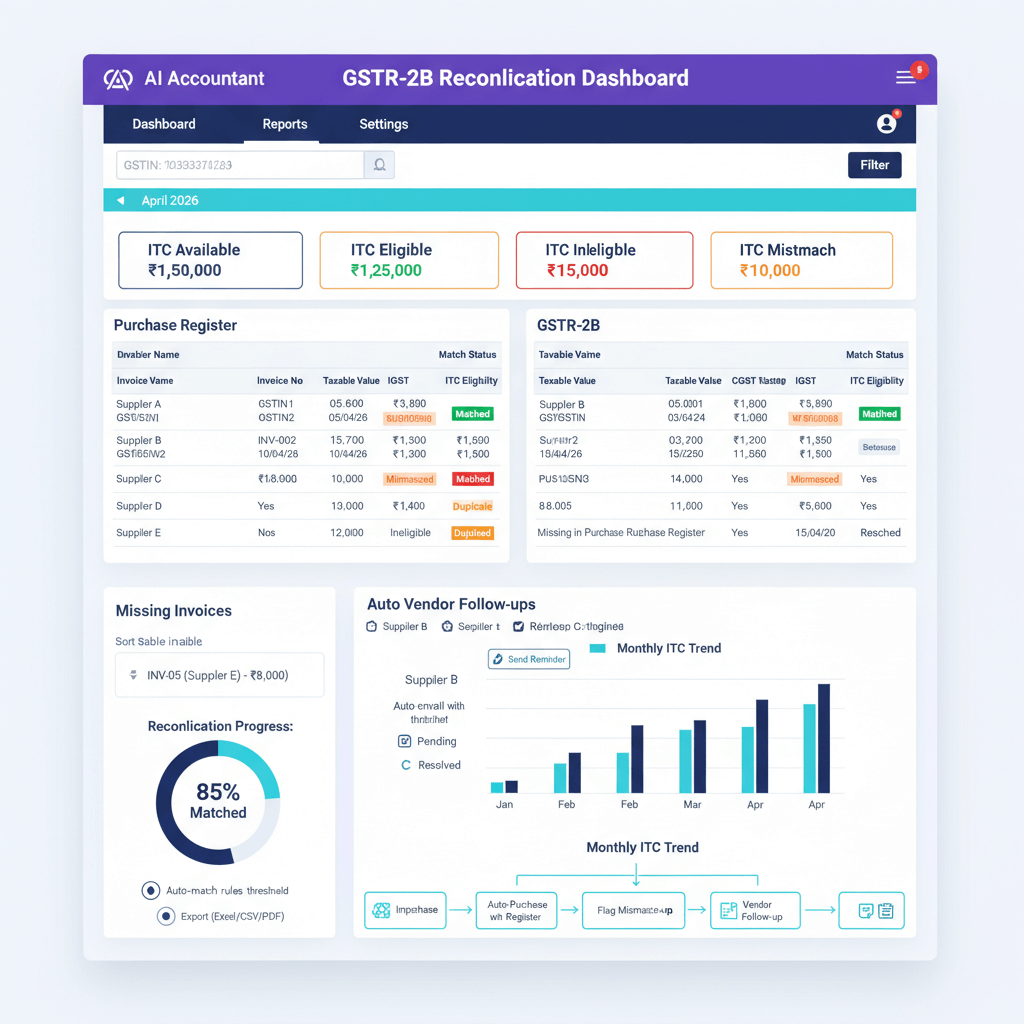Key takeaways
- Virtual CFOs offer strategic financial expertise remotely at 30% lower cost than full time CFOs.
- Flexible engagement models adapt to funding cycles and operational needs.
- Technology integration provides real-time insights and automated reporting.
- Monthly retainer for outsourced CFO services ranges from ₹40,000 to ₹2 lakh.
- Ideal as teams scale post-seed, cross ₹5 crore annual revenue, or face complex compliance.
Understanding Virtual CFO Services in India
In a rapidly evolving startup ecosystem, virtual CFO services India have emerged as a transformative model. By outsourcing high-level financial management to seasoned professionals who work remotely or on a part-time basis, businesses gain access to strategic guidance without the overhead of a full-time CFO. This shift from traditional in-house roles to tech-driven, on-demand partnerships leverages platforms like AI Accountant for real-time dashboards, automated reconciliation, and streamlined reporting.
The result is a lean, flexible approach that aligns financial leadership with growth phases, fundraising rounds, and regulatory demands.
Why Indian Startups and SMBs are Choosing Virtual CFOs
Several key drivers explain the surge in demand:
- Cost Efficiency: Outsourced CFOs cut costs by at least 30%, eliminating salaries, benefits, and infrastructure expenses.
- Flexible Engagement: Choose between retainer, project, or hourly models to match business activity.
- Expert Strategy: Access multi-industry experience for fundraising, compliance, and MIS reporting.
- Tech-Enabled Insights: Leverage AI tools from AI Accountant for automation and accurate forecasts.
“We engaged a virtual CFO six months before our Series A; they restructured our reporting, built investor dashboards, and streamlined due diligence. After funding, we scaled down to quarterly reviews.”
CFO as a Service vs Traditional CFO: Understanding the Difference
The contrast goes beyond employment structure:
- Payment Model: Pay-as-you-go retainer vs fixed salary plus benefits.
- Flexibility: Scale services up or down vs fixed commitment.
- Expertise: Broad, multi-sector experience vs deep, company-specific focus.
- Technology Adoption: Early adopters of finance automation vs conventional methods.
Strategic Finance Advisor for Startups: Core Responsibilities
Financial Modeling and Forecasting
Develop robust revenue projections, expense forecasts, and scenario analyses using tools like the AI Accountant scenario planner. These strategic models guide major funding and operational decisions.
Burn Rate Management and Cash Flow Planning
Monitor runway, set up real-time cash flow systems, and define alert thresholds. Platforms such as the AI Accountant cash flow module automate tracking to prevent crunches.
Investor Relations and Due Diligence Support
Create compelling pitch deck financial sections, respond to investor queries, and conduct diligence scenario analyses to optimize valuation and dilution.
Technology Integration and Automation
Leverage AI accounting software to automate reconciliation, generate intelligent reports, and deliver actionable insights rather than just historical data.
Strategic Advisory During Critical Phases
Provide guidance on business pivots, expansion decisions, and operational scaling, ensuring financial stability aligns with growth objectives.
Outsourced CFO Cost: Investment Analysis for Indian Businesses
Costs vary by engagement and complexity:
- Monthly Retainer: ₹40,000–₹2 lakh based on service intensity.
- Hourly Rates: ₹2,000–₹10,000 per hour for specific deliverables.
- Project Fees: ₹50,000–₹5 lakh for end-to-end fundraising or system implementations.
- Performance Fees: Success-based bonus tied to funds raised or milestones achieved.
- Part Time CFO: ₹5–15 lakh annually, flexible retainer.
- In-House CFO: ₹30–75 lakh plus benefits, full-time commitment.
- Finance Manager: ₹6–15 lakh, operational focus.
- Project CFO: ₹1–10 lakh, one-time deliverables.
While initial investment may seem high, the ROI from optimized tax strategies, error prevention, and successful fundraising often outweighs costs.
When Should a Business Hire a Part Time CFO?
- Post-Seed Funding: Increased reporting and compliance demands overwhelm founding teams.
- Revenue Milestones: At ₹50 lakh monthly or ₹5 crore annual revenue, manual systems break down.
- Multi-Entity Operations: Expansion triggers complex consolidation and regulatory filings.
- Cash Flow Volatility: Seasonal or irregular revenue patterns require proactive planning.
- Compliance Burden: Complex GST, FDI, or MCA filings, or regulatory notices.
- Fundraising Preparation: Six months before a round to clean records and build investor narratives.
“When our recurring revenue hit ₹50L per month, our founding team spent 20 hours weekly on financial tasks and still missed unit economics insights.”
FAQ
What are the main advantages of hiring a virtual CFO through AI Accountant for my startup?
Engaging a virtual CFO from AI Accountant provides cost-effective, on-demand strategic expertise, real-time dashboards, automated reporting, and scalability without full-time overhead.
How can a virtual CFO help in preparing for a Series A round?
A virtual CFO organizes financial records, builds investor-ready dashboards, runs scenario analyses on funding impact, and supports due diligence to streamline the Series A process.
What engagement models do virtual CFO services offer in India?
Common structures include monthly retainers, hourly rates for specific tasks, project-based fees for deliverables, and performance-linked success fees linked to fundraising milestones.
When should my business switch from DIY accounting to a part time CFO?
Consider hiring once manual spreadsheets fail to handle monthly revenue above ₹50 lakh, compliance grows complex, or founders spend excessive time on finance instead of core operations.
How does AI Accountant automate cash flow forecasting for SMBs?
AI Accountant integrates bank feeds, projects burn rates, sets alerts for low balances, and generates rolling forecasts to anticipate cash shortages and optimize working capital.
Can a virtual CFO handle multi-entity consolidated reporting?
Yes, they design intercompany transaction processes, automate consolidation in platforms like AI Accountant, and ensure compliance across states or subsidiaries.
What performance metrics should I track with a virtual CFO?
Key metrics include burn rate, runway, revenue growth rate, customer acquisition cost, lifetime value, and operating cash flow—all monitored in real-time dashboards.
How do I measure the ROI of outsourced CFO services?
Compare costs against benefits like funding secured, error reduction, tax optimizations, time saved by founders, and improved decision-making driven by accurate forecasts.
How flexible are virtual CFO contracts when my needs change?
Most providers allow scaling services up or down monthly, switching between retainer and project models, or pausing engagement during slow periods to control costs.
Is compliance management included in virtual CFO services?
Yes, virtual CFOs manage statutory filings, GST compliance, MCA returns, and audit coordination, reducing the risk of penalties and ensuring timely submissions.
-01%201.svg)





